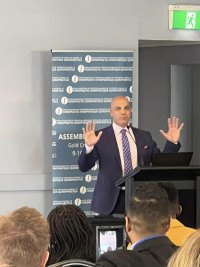Boghosian Announces IBCE's Latin American Competency Testing Program

The recent announcement made by Karlos Boghosian, DC, President of the International Board of Chiropractic Examiners (IBCE), at the 17th WFC Biennial Congress in Queensland, Australia, has raised eyebrows and skepticism in the chiropractic community. To the average chiropractor, the IBCE's move to launch a Latin American competency testing program and provide an update on the World Federation of Chiropractic's (WFC) world competency testing may seem like a step in the right direction, but it comes at a time when the IBCE, the National Board of Chiropractic Examiners (NBCE) and the Federation of Chiropractic Licensing Boards (FCLB) intentions are under scrutiny due to an ongoing lawsuit as well as their monopolistic activities within the chiropractic profession.
A Lawsuit Casts a Shadow
Keita Vanterpool DC's lawsuit against the FCLB, Karlos Boghosian and Carol Winkler, both Past Presidents of the FCLB, has brought to light some troubling allegations. Vanterpool, who served as the Vice President of the Federation of Chiropractic Licensing Boards (FCLB), alleges racial discrimination and civil conspiracy. The FCLB, however, has denied these accusations, claiming they are without merit.
What makes this lawsuit particularly noteworthy is the insight it provides into the complex web of questionable legal and financial relationships among the FCLB, NBCE, IBCE, CCE, state chiropractic regulatory boards and members of the Chiropractic Summit group. These entities effectively form a chiropractic monopoly cartel, controlling education, regulation, and licensing within the profession. These questionable relationships are supported by discovery documents in the Vanterpool case.
The United States Department of Education has previously identified this cartel and its related monopolies, raising concerns about the flow of federally backed student loan money, related student loan debt, and state tax dollars through these nonprofit and for-profit organizations.
The Chiropractic Summit: A Shrouded Mystery
One of the intriguing aspects of this controversy is the mention of the "Chiropractic Summit," a self-selected group of organizations that plays a significant role within this chiropractic cartel within the discovery documents. According to publicly available discovery documents the number one reason given for the vote by the FCLB Board to suspend Vanterpool from her position as Vice President of FCLB were addressed to her in a March 4, 2022, FCLB Board meeting. Vanterpool had the nerve to contact the Summit personnel to solicit an invitation to attend the 2021 Chiropractic Summit meeting.
This was apparently a very big deal to Boghosian, Winkler and he FCLB who obviously did not want Vanterpool to have a seat at the table.
CLICK HERE for more on that story
There is a veil of secrecy surrounding this Summit group. It lacks a public website, and efforts to contact them have been met with silence or blocked access. Lisa Love-Smith, the Executive Director of the Michigan Association of Chiropractors (MAC), is listed as the administrator of the Summit on the FCLB's website. Yet, she has not responded to requests for information about the organizations that make up the Summit or its membership requirements.
This opacity raises questions about the influence and power of this uncharted group within the chiropractic profession, its relationship to the NBCE, FCLB, CCE and state regulatory boards. How does the Chiropractic Summit impact decisions related to chiropractic education and regulation, and to what extent are their interests aligned with those of the IBCE and other organizations?
The IBCE's Role and Intentions
The IBCE claims it was established with the aim of promoting international standardization of chiropractic education and assessment. It claims to be impartial, not embracing any particular philosophy of chiropractic. However, given the ongoing controversy surrounding the profession, it's reasonable to scrutinize the intentions behind the IBCE's recent announcements.
While the launch of a Latin American competency testing program and the update of the WFC's world competency testing may sound like positive steps, one cannot ignore the context in which these announcements are made. Skeptics are left wondering whether the IBCE is truly dedicated to advancing chiropractic or if it is just another piece of the puzzle in the larger chiropractic cartel.
The IBCE's recent announcements at the 17th WFC Biennial Congress are met with skepticism and doubt, given the ongoing lawsuit and the shadow it casts on the chiropractic profession's inner workings. Transparency and accountability are vital to ensure the best interests of both chiropractors and the public they serve are protected. Until these concerns are addressed, the chiropractic community will continue to question the motives and actions of organizations like the IBCE and their associations with the chiropractic cartel.

Blogs
- The Chiropractic Cartel: A Look Back at Bias in Accreditation and its Imact on Today's Profession
- Inside Montana's Chiropractic Monopoly: ACA & MCA's Brazen Board Takeover
- Concerns Grow About Control of the NY State Chiropractic Board by the ACA - Use of X-ray in NY Under Threat
- Reproductive Health Information and Chiropractic Care: Navigating New Privacy Regulations
- Navigating Substance Use Disorder (SUD) Consent: What Chiropractors Need to Know













